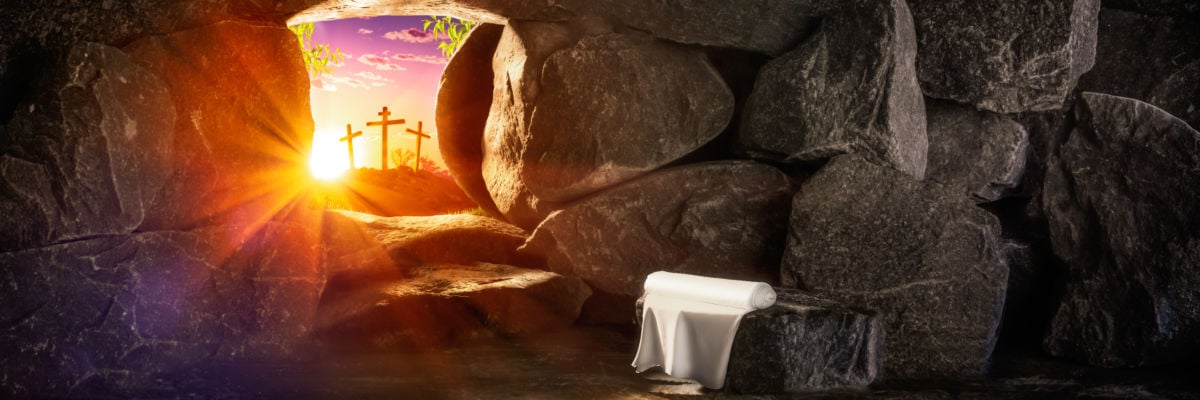
Homily for Easter Sunday, 2021
On the first day of the week,
Mary of Magdala came to the tomb early in the morning,
while it was still dark,
and saw the stone removed from the tomb.
So she ran and went to Simon Peter
and to the other disciple whom Jesus loved, and told them,
“They have taken the Lord from the tomb,
and we don’t know where they put him.”
So Peter and the other disciple went out and came to the tomb.
They both ran, but the other disciple ran faster than Peter
and arrived at the tomb first;
he bent down and saw the burial cloths there, but did not go in.
When Simon Peter arrived after him,
he went into the tomb and saw the burial cloths there,
and the cloth that had covered his head,
not with the burial cloths but rolled up in a separate place.
Then the other disciple also went in,
the one who had arrived at the tomb first,
and he saw and believed.
For they did not yet understand the scripture
that he had to rise from the dead.-John 20:1-9
The Gospel of St. John, the Beloved Disciple, practically ends with this teaser:
There are also many other things…but if these were to be described individually, I do not think the whole world would contain the books that would be written.
If we were to accept the renegade bishop John A.T. Robinson’s striking thesis that John’s Gospel was the first to be written, then indeed, right away in Christian history, we see that the faithful loved to find or produce new writings that give more details of Our Lord’s saving deeds and words. The other three Gospels give us very different but complementary accounts of the Savior’s life, mission, and glory.
If we go beyond the canonical scriptures, we find in every age some attempts to fill out our imaginations and insights—from the first-century Odes of Solomon (not the Song of Songs) to the second-century Protoevangelium of James, down through the centuries with various accounts taken from the personal experiences of the saints in prayer. Some of these works are amazingly long, far longer than the concise and inspired Gospels. Though they are non-canonical, the Church has often approved of the faithful reading these works since they are the fruit of the Holy Spirit’s working in the inner life of one soul, whose experience may give a grace of insight to others.
In fact, any Christian who takes today’s Gospel lesson on this Feast of Feasts, and spends some time prayerfully considering it, will surely have some insights given by the Lord; if these were written down in each case, they really would fill the world with the deeds of the Lord in those individual souls. Part of our joy in heaven will be to see the rest of the Lord’s saving work in the lives of each one, throughout time, who, believing in the gospel, became part of the story of that gospel in flesh and blood.
St. Paul says, “He loved me and gave himself for me.” That means that Christ’s gospel, especially his saving death, burial, and resurrection, are events in which I had and have at true part in his intentional thought and love.
Our thoughts and prayers and contemplations about these mysteries of faith really matter. This is because, as Bl. Columba Marmion said, “The mysteries of Christ are our mysteries.”
I will give you one “crazy” example from my abbey monastery. There is one fine priest confrere who holds that Our Lady was so convinced that her son would rise from the dead that she would not leave him by himself in the tomb, but kept vigil for him there, awaiting his resurrection.
Now, this cannot be proven from the scriptures, nor could it be a doctrine of the Faith, but let’s be clear: most things about our religion cannot be defined dogmas, yet our living-out of those teachings leads each of us to certain insights that are coherent and beautiful and orthodox even though they are not “binding.” After all, the Church approves the veneration of certain apparitions, without claiming that they are revelations to be placed in the deposit of faith. How idiotic it would be to argue over different paintings of the Nativity or the Crucifixion or the Resurrection as though any one human consideration of theses mysteries could exhaust their meaning!
The Church needs all of our insights; that is, the Church wants all of us to meditate and contemplate on the mystery of the Lord’s resurrection throughout this great octave of Easter. In deepening our affection and insight, our love and our understanding of the gospel scenes, we not only enrich our own inner life but add to the depth and the power of the faith of the Church on earth, awaiting the happy day of our own resurrection on the Last Day.
What else is the rosary, or the Divine Office, than such a meditation? This the work of Christians, to dig deep in the rich mines of Jesus’ mysteries, and find gold, silver, and precious stones of love and light for ourselves and our neighbors. Let’s take the time this week to look at all four of the Gospel accounts of the Master’s glorious rising and we will find it to be true.
Inspired by my confrere’s ardent trust in the loving will-power and faith of the Blessed Mother, I wrote this little sonnet about one detail in today’s Gospel lesson, the folded napkin apart, which lends support to his inner vision of Our Lady’s time in the tomb. Here it is, to be read slowly and carefully:
Bethlehem Revisited on Easter:
A Loving Midrash on John 20, 6-7
Apart, the nard-soaked napkin for His Face
Was rolled up neatly by some unnamed hands.
Opposing thumbs and fingers moved with grace
To work to tidy up the swaddling bands
Within a cave where He’d been laid to sleep
While silent angels gasp and women grieve.
Who stayed there with Him in the darkness deep,
Sealed in a place so no one yet might leave?
John’s Gospel names no name, but gives a hint
To those who read between the lines with hearts
Awake to love’s eyes staring hard as flint,
Aroused to hope’s unbending, well-aimed darts:
“Get up, my son, be born again and flee”
His Mother said, “And leave the rest to me.”



